Klingenberg-Colmnitz | |||||||||||||||||||||
|---|---|---|---|---|---|---|---|---|---|---|---|---|---|---|---|---|---|---|---|---|---|
| Former interchange station | |||||||||||||||||||||
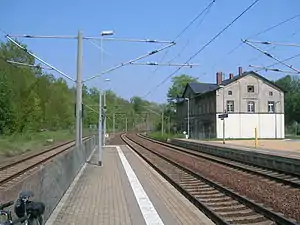 Standard-gauge entrance building looking towards Dresden | |||||||||||||||||||||
| General information | |||||||||||||||||||||
| Location | Bahnhofstr. 12, Klingenberg, Saxony Germany | ||||||||||||||||||||
| Coordinates | 50°55′33″N 13°30′03″E / 50.92586°N 13.50095°E | ||||||||||||||||||||
| Line(s) |
| ||||||||||||||||||||
| Platforms | 2 | ||||||||||||||||||||
| Other information | |||||||||||||||||||||
| Station code | 3271[1] | ||||||||||||||||||||
| DS100 code | DKC[2] | ||||||||||||||||||||
| IBNR | 8012044 | ||||||||||||||||||||
| Category | 6[1] | ||||||||||||||||||||
| Website | www.bahnhof.de | ||||||||||||||||||||
| History | |||||||||||||||||||||
| Opened | 28 June 1855 | ||||||||||||||||||||
| Services | |||||||||||||||||||||
| |||||||||||||||||||||
Klingenberg-Colmnitz station is a station on the Dresden–Werdau railway and the start of two former 750 mm gauge railways, the Klingenberg-Colmnitz–Oberdittmannsdorf and the Klingenberg-Colmnitz–Frauenstein railways, in the municipality of Klingenberg in the German state of Saxony. The station is the top station of the Tharandter Steige ("Tharandt climb").
History
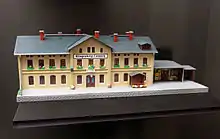
The station was built on 11 August 1862 with the opening of the Dresden-Werdau railway. Immediately after the opening, the station at the top of the Tharandter Steige, which was feared by the operators of steam trains, was of great importance, as almost all the trains had to be assisted by bank engines from Tharandt station. Trains had to climb 230 metres of altitude from the valley station on a twelve kilometre-long section.

The station initially had fewer regional connections, but it was important as a point for the detachment of bank engines after the completion of the climb. A photograph of the station shows it with only one platform,[3] but, in another photograph, the same area is visible looking towards Freiberg with two platforms.[4] The freight train tracks look rather modest with a total of five tracks.
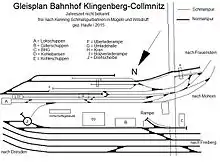
This changed on 14 September 1898 with the opening of the Klingenberg-Colmnitz–Frauenstein narrow-gauge railway, which was supplemented by the Klingenberg-Colmnitz–Oberdittmannsdorf narrow-gauge railway in 1923. The station precinct was now larger as they can be seen on the depicted track plan. Until the beginning of the 1970s, the railway lines remained in this form. For the exchange of goods, there was only one transhipment hall and two loading cranes, one in the station forecourt and one at the exit of the narrow-gauge railway towards Frauenstein and towards Oberdittmannsdorf.[5] Rollbock devices and transporter wagons were never used on the Klingenberg-Colmnitz–Frauenstein railway and transporter wagons were used only as far as Naundorf on the railway to Oberdittmannsdorf.[6] In addition, a shed with two tracks, each capable of holding two locomotives,[7] a coal shed [8] and a coal store[9] were built in the narrow-gauge section of the station. This locomotive depot had already been built by the opening of the line to Frauenstein. This meant that the track layout of the station was essentially complete.
It was not until 1927 that the two signal boxes W1 and B2 were built to take control of the standard gauge section north of the station building.[10] Around 1930, here was a facility for turning locomotives to the east of the station's workshops. The turntable had three rails and could be used to turn narrow-gauge locomotives.[11]
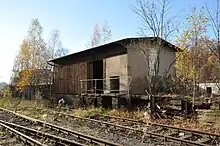
The standard-gauge tracks were electrified on 25 September 1966. When the two narrow-gauge lines were closed in 1972, the narrow-gauge tracks were removed at Klingenberg-Colmnitz station, but the standard-gauge tracks remained essentially the same. Instead of the possibility of transferring it to a narrow-gauge line, one crane was transferred to a steel construction company and the other was dismantled.[12] The remaining buildings from the narrow-gauge railways were a loading hall and the stand for a transfer crane. The four tracks in the narrow-gauge area were used for dispatching wagons. In 2000, the station was connected to an electronic interlocking. This was the occasion for thoroughly modernising the station to meet modern requirements. The station forecourt was converted into a combined bus station and car park. Since then, the station has been operated with three through tracks; two tracks are adjacent to the entrance building, including one with an outside platform, and there is also a northern overtaking track. An underpass with a lift (which is a little small) was built between the two outside platforms. The connection to track 7 is still preserved, as is the standard-gauge track on the former narrow-gauge side of the station. It is no longer usable. In 2009, the freight shed was demolished.[13][14] The abandoned signal boxes have now been demolished.[15][16] A functional relic from the narrow-gauge era is the coal shed, which can still be seen in photos in 2011.
 The forecourt of the station on the narrow-gauge side with the recognisable coal shed in the background
The forecourt of the station on the narrow-gauge side with the recognisable coal shed in the background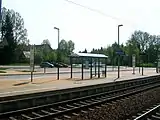 The forecourt of the station overlooks the site of the former freight shed
The forecourt of the station overlooks the site of the former freight shed Platform looking towards Freiberg
Platform looking towards Freiberg
Platforms
During the narrow-gauge era, the station had two raised outside platforms on the standard-gauge section and two ground level platforms for the two narrow-gauge lines.
Rail services
Both narrow-gauge lines can be viewed as connecting lines of the network around Wilsdruff and Frauenstein, allowing residents to travel by train to work in the Plauenscher Grund (the valley of the Weißeritz downstream from Freital) or for recreation in the Eastern Ore Mountains. 134,000 passengers and about 35,000 tonnes of freight were transported in the first year of operation on the Klingenberg-Colmnitz–Frauenstein railway. Due to the lack of facilities for the rolling stock traffic, the volume of goods stagnated and peaked at 30,000 tonnes per year.[17] In 1914, four pairs of train ran between Klingenberg-Colmnitz and Frauenstein.[18] In 1922, two train pairs operated between Klingenberg-Colmnitz and Naundorf, the terminus of the Klingenberg-Colmnitz-Oberdittmannsdorf railway.[19] In 1925, there were five train pairs between Klingenberg-Colmnitz and Frauenstein[20] and two train pairs between Klingenberg-Colmnitz and Oberdittmannsdorf.[21] In 1932, there were six train pairs between Klingenberg-Colmnitz and Frauenstein[22] and only one train pair between Klingenberg-Colmnitz and Oberdittmannsdorf, which continued to Mohorn.[23] In 1939, there were eight trains between Klingenberg-Colmnitz and Frauenstein.[24] In the war year of 1943, one train pair operated between Klingenberg-Colmnitz and Mohorn.[25] The timetable for 1946/1947 shows only three train pairs for the Klingenberg-Colmnitz–Frauenstein line.[26] In 1950/1951 there were three train pairs on the Klingenberg-Colmnitz–Mohorn line, one of which ended in Naundorf.[27] In 1960, there were six train pairs on the line to Frauenstein.[28] In the last full year of operation, four train pairs operated on the line from Klingenberg-Colmnitz to Mohorn[29] and in the same year there were also four train pairs on the Frauenstein line, one of which only ran on Saturdays.[30]
References
- 1 2 "Stationspreisliste 2024" [Station price list 2024] (PDF) (in German). DB Station&Service. 24 April 2023. Retrieved 29 November 2023.
- ↑ Eisenbahnatlas Deutschland (German railway atlas) (2009/2010 ed.). Schweers + Wall. 2009. ISBN 978-3-89494-139-0.
- ↑ "Photograph of Klingenberg-Colmnitz station" (in German). auf www.sachsenschiene.net. Retrieved 27 December 2016.
- ↑ "Photograph of Klingenberg-Colmnitz station" (in German). auf www.sachsenschiene.net. Retrieved 27 December 2016.
- ↑ "Photograph of the narrow-gauge part of Klingenberg-Colmnitz station with a standard-gauge train at the exit towards Frauenstein" (in German). www.sachsenschiene.net. Retrieved 27 December 2016.
- ↑ Ludger Kenning (2000). Schmalspurbahnen um Mügeln und Wilsdruff (in German). Nordhorn: Verlag Kenning. p. 210. ISBN 3-933613-29-9.
- ↑ "Photograph of engine shed in Klingenberg-Colmnitz station" (in German). www.sachsenschiene.net. Retrieved 28 December 2016.
- ↑ "Drawing of the coal shed in Klingenberg-Colmnitz station" (in German). www.sachsenschiene.net. Retrieved 28 December 2016.
- ↑ "Photograph of the coal store in Klingenberg-Colmnitz station" (in German). www.sachsenschiene.net. Retrieved 28 December 2016.
- ↑ "Track plan of Klingenberg-Colmnitz station with signal boxes" (in German). www.sachsenschiene.net. Retrieved 28 December 2016.
- ↑ Ludger Kenning (2000). Schmalspurbahnen um Mügeln und Wilsdruff (in German). Nordhorn: Verlag Kenning. p. 222. ISBN 3-933613-29-9.
- ↑ "Track plan of Klingenberg-Colmnitz station after the dismantling of the narrow-gauge railways" (in German). www.sachsenschiene.net. Retrieved 28 December 2016.
- ↑ "Photo of the freight shed from Klingenberg-Colmnitz station on the standard-gauge side" (in German). www.sachsenschiene.net. Retrieved 28 December 2016.
- ↑ "Photo of the freight shed from Klingenberg-Colmnitz station on the narrow-gauge side" (in German). www.sachsenschiene.net. Retrieved 28 December 2016.
- ↑ "Photo of signal box W1 in the standard-gauge side of Klingenberg-Colmnitz station" (in German). www.sachsenschiene.net. Retrieved 28 December 2016.
- ↑ "Photo of signal box B2 in the narrow-gauge side of Klingenberg-Colmnitz station www.sachsenschiene.net" (in German). www.sachsenschiene.net. Retrieved 28 December 2016.
- ↑ Ludger Kenning (2000). Schmalspurbahnen um Mügeln und Wilsdruff (in German). Nordhorn: Verlag Kenning. p. 210. ISBN 3-933613-29-9.
- ↑ "1914 timetable for the Klingenberg-Colmnitz–Frauenstein line" (in German). www.sachsenschiene.net. Retrieved 28 December 2016.
- ↑ "1922 timetable for the Klingenberg-Colmnitz–Frauenstein line" (in German). www.sachsenschiene.net. Retrieved 28 December 2016.
- ↑ "1925 timetable for the Klingenberg-Colmnitz–Frauenstein line" (in German). www.sachsenschiene.net. Retrieved 28 December 2016.
- ↑ "1925 timetable for the Klingenberg-Colmnitz–Oberdittmannsdorf line" (in German). www.sachsenschiene.net. Retrieved 28 December 2016.
- ↑ "1932 timetable for the Klingenberg-Colmnitz–Frauenstein line" (in German). www.sachsenschiene.net. Retrieved 28 December 2016.
- ↑ "1932 timetable for the Klingenberg-Colmnitz–Mohorn line" (in German). www.sachsenschiene.net. Retrieved 28 December 2016.
- ↑ "1939 timetable for the Klingenberg-Colmnitz–Frauenstein line" (in German). www.sachsenschiene.net. Retrieved 28 December 2016.
- ↑ "1943 timetable for the Klingenberg-Colmnitz–Mohorn line" (in German). www.sachsenschiene.net. Retrieved 28 December 2016.
- ↑ "1946/47 timetable for the Klingenberg-Colmnitz–Frauenstein line" (in German). www.sachsenschiene.net. Retrieved 28 December 2016.
- ↑ "1950/51 timetable for the Klingenberg-Colmnitz–Mohorn line" (in German). www.sachsenschiene.net. Retrieved 28 December 2016.
- ↑ "1960 timetable for the Klingenberg-Colmnitz–Frauenstein line" (in German). www.sachsenschiene.net. Retrieved 28 December 2016.
- ↑ "1971 timetable for the Klingenberg-Colmnitz–Mohorn line" (in German). www.sachsenschiene.net. Retrieved 28 December 2016.
- ↑ "1971 timetable for the Klingenberg-Colmnitz–Frauenstein line" (in German). www.sachsenschiene.net. Retrieved 28 December 2016.
Sources
- Klaus Kieper; Reiner Preuß (1980). Schmalspurbahnarchiv (in German). Berlin: transpress VEB Verlag für Verkehrswesen.
- Ludger Kenning (2000). Schmalspurbahnen um Mügeln und Wilsdruff (in German). Nordhorn: Verlag Kenning. ISBN 3-933613-29-9.
External links
- "Klingenberg-Colmnitz station" (in German). www.sachsenschiene.net. Retrieved 27 December 2016.
- "Klingenberg-Colmnitz–Oberdittmannsdorf railway" (in German). www.sachsenschiene.net. Retrieved 27 December 2016.
- "Klingenberg-Colmnitz–Frauenstein railway" (in German). www.sachsenschiene.net. Retrieved 27 December 2016.
- "Schmalspurbahn Klingenberg-Colmnitz–Frauenstein railway" (in German). www.stillgelegt.de. Retrieved 27 December 2016.
- "Klingenberg-Colmnitz–Oberdittmannsdorf railway" (in German). www.stillgelegt.de. Retrieved 27 December 2016.
- "Schmalspurbahn Klingenberg-Colmnitz–Frauenstein" (in German). Wilsdruffer Bahnbüchern. Retrieved 27 December 2016.
- "Model of the station" (in German). Auhagen. Retrieved 27 December 2016.